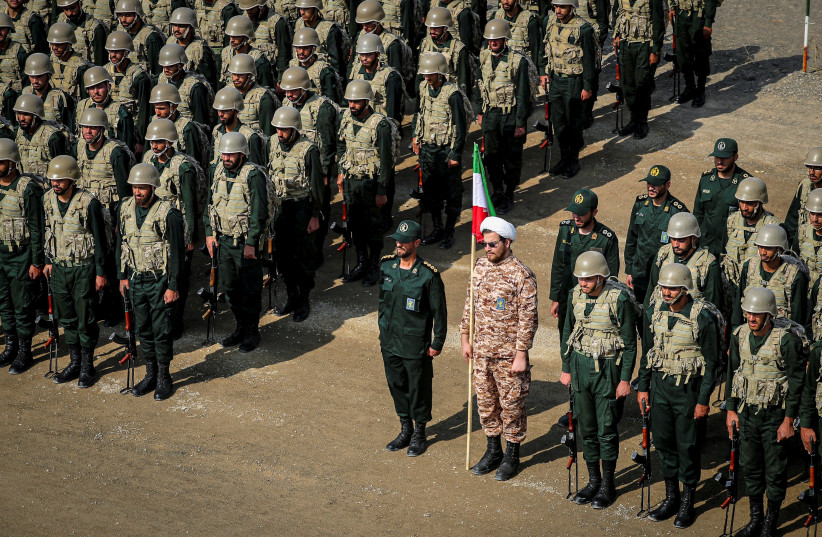German and Austrian companies attended Iran’s annual Oil Show, run by the US-sanctioned National Iranian Oil Company, according to the handbook issued for the Oil Show.
The NIOC finances the Iranian terrorist organization the Islamic Revolutionary Guard Corps-Quds Force, whose chief strategic ally is Hezbollah, and is responsible for the murders of over 600 American military personnel in the Middle East.
The German manufacturer of turbomachines, JCL plant solutions, had a stand at the Oil Show. A representative from JCL recently told Iran International that JCL was present for a “form of interview” at the May Oil Show. United Against a Nuclear Iran (UANI) provided The Jerusalem Post with a copy of the Iran Oil Show handbook. According to the handbook, the German engineering companies JCL and Heggel, along with the Austrian engineering company Rotorise, were present at the Oil Show.
A source who attended the Oil Show told the Post that he saw physical stands for JCL and Rotorise at the event.
The German-Iranian dissident, Kazem Moussavi, a spokesman for the opposition Green Party of Iran in exile, told the Post that the revenue from Iran’s “oil and gas business is used to finance the policy of terror and executions in Iran, the threat of annihilation against Israel and the military, nuclear, missile, and drone programs.”

Moussavi added: “Any European or German and Austrian economic cooperation, including in the oil sector, with the Holocaust-denier regime in Iran must absolutely be ended.”
Fox News Digital first reported in September on Western, Russian, and Chinese companies that attended the Iran Oil Show. Iran International exclusively reported the names of a number of the Western, Chinese, and Russian companies at the Iran Oil Show. Heggel and Rotorise declined to comment about their reported presence at the event. The business emblem for Heggel appears at the end of each page of the 22-page Iran Oil Show handbook, with the company’s website and motto “You build. We Protect!”
Imports from a heavily-sanctioned nation
When asked about the German companies at the Iran Oil Show, Nikolai Hoberg, spokesman for Germany’s Federal Office for Economic Affairs and Export Control (BAFA), told the Post that the agency “examines any existing possible approval requirements or restrictions due to sanctions in accordance with European and national law.”
The spokesman added: “The Bureau of Industry and Security of the US Department of Commerce is responsible for examining the extent to which business activities in Iran are compatible with US sanctions.”
IT IS UNCLEAR if the US plans to sanction the European, Chinese, and Russian companies present at the Iran Oil Show. When asked if the US will crack down on the alleged sanction busters, a State Department spokesperson told FOX Business in a statement: “The United States is closely monitoring transactions involving Iran in the global oil market, and has taken numerous actions against sanctions evaders around the world under the Biden administration. Of course, we do not preview potential sanctions or enforcement actions.”
Germany’s government has remained tight-lipped about the activities of the country’s engineering companies in Iran. “BAFA cannot comment on individual export processes, due to operational and business secrets. In this sense, these can neither be confirmed nor denied,” the BAFA spokesman told the Post when asked about companies being granted permission to conduct business at the Iran Oil Show.
“Information about companies’ participation in trade fairs can only be provided by the companies themselves,” the BAFA spokesman added.
Moussavi, who has campaigned against German-Iran business relations for more than 15 years, said: “I condemn any open or secret collaboration and participation by German, Austrian, and other European companies in the Iranian state oil exhibition, which is soaked in the blood of the oppressed Iranian population.”
He asked, “How can Austrian and German companies, which promote compliance with ethical and human rights principles in their business, take part in the oil exhibition of the clerical fascist regime when they are aware that the Islamic Republic has arbitrarily arrested, tortured, and executed thousands of protesters in the last 12 months who supported the ‘Women, Life, Freedom’ movement?
“This means that European companies cooperating with the regime are complicit in supporting the regime in [Russian President Vladimir] Putin’s war of invasion against Ukraine by supplying drones,” he said.
The Post reported in December that, according to newly published statistics from the Federal Statistical Office of Germany, the country exported €1.2 billion worth of merchandise to Iran from January to the end of October in 2022.
The federal republic imported roughly €260 million in merchandise from Iran.
Daniel Roth, the Research Director for United Against Nuclear Iran, told Iran International: “It’s astounding that European companies like JCL and (reportedly) Rotorise are still willing to take these risks. Providing assistance – and not even ‘significant assistance’ – to NIOC, the show organizer, is a sanctionable offense.
“Washington has the mandate to penalize companies even outside the US through ‘secondary sanctions,’ and should be closely monitoring all participants and any deals that transpire,” he continued. “Chinese and Russian exhibitors, the most likely to actually sign contracts, should certainly not be excluded from scrutiny.”
